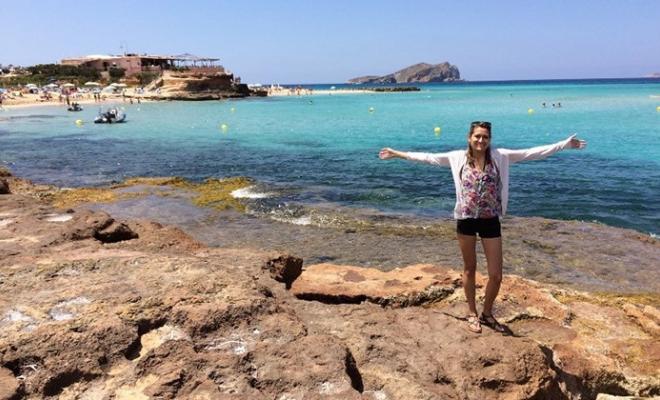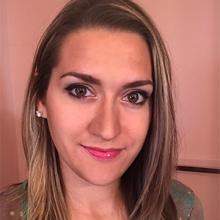Would I ever live long enough to fall in love? Would I be able to graduate college? Would I be remembered for making some kind of impact on the world before I was gone? Would I get to travel to destinations where the breaking waves crashed against a rocky shore and the sea mist sprayed as I breathed deeply, and beside me stood …
I'm startled back to reality. I sit in a hospital bed, surrounded by my parents in chairs on either side of me. I'm on the lumpy foam mattress, where I sit cross legged and my butt sinks at least 4 inches straining my back and adding to the pain the past few weeks -- and this conversation -- have caused me. My dad sits, lips pursed as normal when he listens intently. We are all listening to my doctor talk about my declining health, about my recent episode of pneumonia, and what my future may hold.
“No one knows the future,” I think, as the doctor speaks. My mind jumps again to that ocean scene, only it isn't me standing on the shore, I'm now observing the scene from above, as if in spirit. Observing a couple embrace and I feel a strange sense of sadness, anger, and jealousy.
“It's time to consider a lung transplant.” Those words, uttered from my pediatric CF doctor 6 years ago, made me, in an instant, think about all the joys of life I hadn't gotten to experience yet.
Why me? That's the first thought many people have when they can't accept the reality of what's happening. We try to answer unanswerable questions.
Later that summer, my parents and I followed doctors' advice and scheduled a week-long transplant evaluation. A week of what I still consider to be grueling medical tests, even compared to other lung complications I have developed since. In the end, the transplant evaluators concluded I was not quite in the transplant window at the time. That fall, my health started to stabilize. I started my second year of college and I felt myself withdraw from the world.
To rewind a bit. I had always been a shy and reserved person. I know now my withdrawal was more related to the fear of people's judgment than my introverted nature, but that took me years to unravel and realize.
I was more insecure during high school than at any other point in my life. Having cystic fibrosis and protective parents contributed to my situation. I call it a situation now because it felt like I was in a predicament I couldn't quite figure out how to leave behind. I wanted to be social and make friends, but it was never easy. Having CF seemed like a huge obstacle that kept me from getting close to people. What were others going to think when they saw me taking digestive enzymes or drinking weight gain supplements? I felt everyone's glaring pupils watching me, sensing I was different.
Every day I went to the nurse's office in school to do my breathing treatments. There was a curtain that covered about half of the doorway to give me some privacy. I would move my chair as far back from the little gap in the curtain to make sure absolutely no one could see me in there. Once or twice someone would peep through the gap. I hated it. I wanted to melt away.
I struggled with these insecurities through my first year of college too, but after doctors told me I needed to be evaluated for a transplant, I really hit my low point.
I had so much anxiety about going to classes. I was fearful I would imagine some medical emergency happening to me.
During a test, I would be in the second row from the back of an auditorium of students chewing on the end of pencils and seconding guessing their answers. The girl sitting next to me would scream, “Oh my God, help her!” after she saw me slump at my desk, face white, lips blue, unconscious, and not breathing. I'd be remembered for that event, and not who I was. Everyone would know. Everyone would know I was a dying 19-year-old.
I stayed at home a lot the next few months, until I felt unsatisfied with the melancholy life I was living. It started to evolve from only fear of dying to fear of dying before I had started living. It wasn't other people I was scared of. I was more scared of departing, not having lived the life I wanted.
I've seen articles and videos where they interview elderly people on their deathbeds who are asked what they regret in life. Most people regret not having lived passionately, fulfilled, happy. I believed I would be one of them if I didn't make a change.
At the start of my junior year, I couldn't sit around and let life pass me by. I got the courage to join a sorority and other social clubs on campus. I began to open up and feel more comfortable telling people about my condition and not caring how they reacted. I started talking to people in my classes more easily. I made more friends and realized that people liked me. They say practice makes perfect. I think it took a will to change, and the determination to keep at it. It was hard at the beginning, but with each interaction, with each phone number exchanged and lunch meeting planned, it became easier.
Since those early stages, just a mere five years ago, I've become the person I saw in my mind.
Today, I am able to stand in front of a group of medical professionals speaking about my personal experiences with CF, my medical regimen, and patient advocacy. Through becoming more open about myself, gaining self-confidence, and having an increased sense of responsibility for my own health, I have developed an excellent relationship with my adult CF care team.
I have found that self-advocacy and good communication are vital to receive optimal care. My involvement in the CF community has grown. I am on the patient advisory council at my clinic and a director of the United States Adult CF Association (USACFA). I actively seek clinical trial opportunities and interact with other people with CF on social media.
But it doesn't stop there. Every day, I strive for more. For more breaths, for more knowledge, for more personal connections that fulfill me deeply.
I look back and see the transformation I've made, and I'm proud. I don't credit joining a sorority with being the event that changed me as a person. Rather, it was a catalyst to feeling more comfortable with sharing parts about my life that I hadn't before. Through that process, I started the journey of finding myself.
Although my lungs have held on, I've had many friends and family members by my side through weeks of hospital stays. They've been there when I've barely been able to walk a few feet without a leash of liters of supplemental oxygen flooding my nostrils. I've had my love sit with me for many hours of nebulizers to help clear mucus out of my diseased and tightening airways.
I am still waiting for the day I'll be able to breathe deep with transplanted lungs. I'm more ready now. But until then, I've learned to live each moment without fear. I won't be fearful to love to the fullest, to be bold, speak my mind, and let others experience who I am.
I flash back to those memories of sitting on the hospital bed, hearing those words about considering a transplant, having visions of a beautiful life I may never know. If I think back to that imaginary shore where I watched the breaking waves crash and I observed a couple standing, I no longer feel the sadness, the jealousy, or the feeling of missing something amazing. Because it has been me. It is me. I've felt love. I've felt heartbreak. I've felt immense joy. I've seen beautiful coastlines and I've felt the feeling of awe, of being one small fraction of such an intricate, fascinating, and inspiring world.




